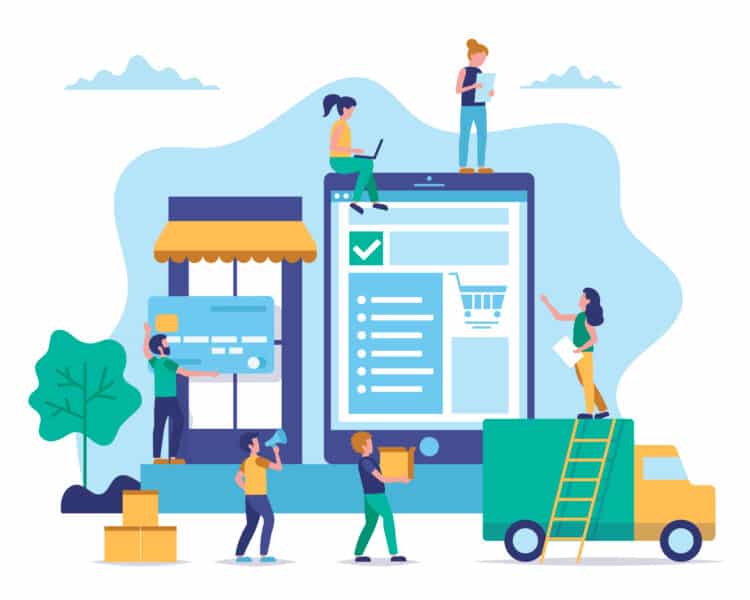How To Increase Customer Retention By Using Interactive Content


By The BBS Agency
March 28, 2022
Most marketers agree that interactive content is great at generating leads, improving user experience, and boosting sales. But it can also help increase customer retention as well! Interactive content requires active engagement from the user, which ultimately leads to higher conversions thanks to the memorable and personalized experience that interactive content creates. When it comes to customer retention, interactive content helps keep users invested in your brand and clients satisfied. Examples of effective interactive content include videos, quizzes, infographics, and surveys. All of these provide value to your users or ask for their feedback. When you use their feedback to bring them more value, you’ll keep customers satisfied and returning for years to come. If you have any questions about customer retention or interactive content or want us to handle it for you, reach out to us at Prebuilt Sites or The BBS Agency. We’d love to help you out!
There are many ways to increase customer retention, like keeping your clients satisfied with personalized experiences. That’s exactly why you need to know about what interactive content can do for your business strategy.
So, you’ve probably heard that content is king. While that may be true, there is a new player in town.
Interactive content, and it’s ready to take over the digital marketing world. In fact, it already has.
Most marketers agree interactive content is great at generating leads, improving user experience and boosting sales.
But can it increase customer retention as well? Our answer is: definitely.
In this blog post, we will cover the topics below and show you how interaction is something that consumers want to do.
- First of All, What is Interactive Content?
- Why Should Your Business Worry About Customer Retention?
- How Does Interactive Content Increase Customer Retention?
- Wrap Up: Interactive Content is Key to Increase Customer Retention
First of All, What is Interactive Content?
Simply put, interactive content is any kind of content that requires direct and active engagement from a consumer as opposed to passive consumption of the content.
Most people consume and engage in interactive content without even realizing it.
The problem is that some marketers turn a blind eye to interactive content because they believe it is too complex and costly to create.
However, interactive content should be a priority. The reason for this is that it can help with customer retention. Customers simply like interactive content.
Here are a few statistics to take in real quick.
- 91% of B2B buyers prefer interactive content to passive content.
- Visual content is 40 times more likely to be shared by consumers on social media and conversion rates are increased by 86%.
- 360-degree videos are watched 28% more than standard videos.
- 80% of online users will watch a video through, but a mere 20% of them will actually read the content.
This data proves that interactive content matters.
Ultimately, interactive content grabs the attention of a consumer by offering them a personalized experience.
Due to the fact that they will enjoy the experience, they will be more inclined to provide their info, increasing the chance of a qualified lead and potential conversion.
Further, interactive content gathers more data from the customer. As such, you have that data at your fingertips, allowing you to create content that you know the customer will love.
Eventually, this helps to establish authority and trust in the eyes of the customer, growing a larger audience of customers that will continue coming back to your brand over and over again.
Why Should Your Business Worry About Customer Retention?
Businesses spend more time, money, and effort trying to find new customers rather than keeping their existing ones.
Customer retention is referred to as the simple act of being able to retain customers over a certain period of time.
Ultimately, it is keeping customers loyal to you after you have reeled them in.
While acquiring new customers is important to the success of your business, it’s important to realize that existing customers are a significant asset to your company.
The numbers prove this.
Did you know that there is a 40% higher chance of selling to an existing customer than a brand-new customer?
It can also be anywhere from 5 to 25 times more expensive to acquire a new customer as opposed to retaining a current one.
So, it is imperative that you are spending your marketing dollars on customer retention strategies.
And your content marketing strategy should consist of interactive content.
How Does Interactive Content Increase Customer Retention?
Now that you know what interactive content is and why customer retention is so important to your business, it’s time to get down to the nitty-gritty.
How can you use interactive content to increase customer retention?
Interactive content takes on many forms and can be applied to virtually any kind of digital marketing campaign that utilizes content.
You just need to know what type of content to use and how to use it effectively so it adds value, increasing the chance of retaining the customer.
This is where a program like Ion comes into play. It walks you through step-by-step to develop personalized interactive content that delivers results quickly and efficiently.
To retain customers, you need to keep them informed, engaged and entertained — 3 things interactive content can do for you.
Here are some concrete examples of content that will satisfy your audience’s needs:
1. Quizzes
Quizzes are a very popular form of interactive content. They can be extremely fun and even informative.
The great thing about quizzes is they can be used at almost every stage of the sales funnel, from awareness to post-purchase.
You should also:
Ensure the content is relevant
The key to using quizzes to gain the attention of the buyer and/or to retain the customer is to ensure the content is relevant.
Otherwise, there is a good chance they will lose interest and move on.
For instance, you don’t want to send a quiz to a user about Harry Potter if you are selling products related to makeup.
Personalize everything
You want to ensure the quizzes are personalized so your customers get something out of them.
This will increase the chances of them exploring your product or service further after the quiz.
The results of the quizzes can also help you learn what to send to your customer at a later date in an e-mail, newsletter, text message, etc.
With this information, you can personalize your content for your audience so they feel more valued and heard rather than just another customer who has purchased from you previously.
Educate you audience
Quizzes can be used to help the user learn more about the product or service itself.
This helps customers learn every nook and cranny of the product/service while also gaining the trust of the brand.
Example
Let’s look at eyewear companies (pun intended).
Many people tend to buy a pair of eyeglasses without taking their face shape into account. As a result, they are extremely unhappy with the way they look.
Zenni took this problem into account and developed an interactive face shape quiz that people can take to learn their face shape.
In addition, the quiz delivers several customized eyewear suggestions based on the preferences of the user.
Don’t overlook the power of popularity polls either, such as customers preferring A or B.
This can help you in the development of future products and services while also showing your customers that you truly value their opinion on the future betterment of your brand.
When customers feel their opinions are valued in the decisions of a company, they are more likely to stick around and continue being loyal.
2. Infographics
Infographics are an easy, colorful, and visual way to get important information across to a user.
They highlight specific sets of data that users need to know in a short, concise manner.
Infographics are far more appealing than a large cluster of text, which is why they are more likely to be read and shared with others.
In fact, content with infographics received 72% more views than standard articles.
To stand out even more, you need to go above and beyond with your infographics. That’s where interactivity comes in.
Interactive infographics bring engagement into the picture
For instance, some users may want more information regarding the data in an infographic.
Rather than scrolling all the way to the bottom of the infographic and going through a set of statistical links, the user can simply click on the section they’d like more information about, which may or may not have a link that takes them somewhere else.
Alternatively, you could set up the infographic so the user could hover over a certain data point for a graphic or text box to pull up, giving additional information about that particular point.
This works particularly well for timelines.
Example
Check out this interactive infographic of top dog names by breed.
You simply click on a dog breed and it pulls up all of the most popular dog names for that breed in the bigger circle at the bottom.
In addition, it has the dog breeds broken up by small, medium, and large — and by color — making it easy to find the breed you’re looking for.
At the very bottom, you can see a fun fact about each breed.
Interactive infographics simply drive more engagement. It’s as simple as that.
By directly engaging with the graphic, your customers will be more inclined to learn about the information you’re sharing, which tends to translate into a genuine interest in your brand as a whole.
3. Videos
Videos in and of themselves are an interactive form of content because they tend to be narrative rather than consist of static content.
Because of this, it is probably the easiest type of interactive content to utilize in digital marketing.
Interactive video does get a bit trickier, though.
You see, with interactive videos, the user is no longer a spectator. Instead, the user is actually taking part in the video and making decisions.
Depending on the extent of the interactive video, the user can define the direction of the video, including the outcome.
By incorporating interactive video into your brand, you can expect users to stay on your site longer and likely engage with your products/service.
When users interact with videos, their attention remains on that content.
As a result, there is nearly a 600% increase in user activity. Furthermore, interactive videos tend to have 10 times increased click-through rate as opposed to passive videos.
Interactive video may sound a little intimidating, but it is just an experience that offers entertainment.
Examples
The company Lifesaver created an interactive training video that teaches both the Heimlich Maneuver as well as CPR, and you get to determine the outcome of the situation.
The viewer becomes the lifesaver for individuals who are literally in life-or-death situations, such as choking or cardiac arrest. As the lifesaver, it is up to you to decide what steps to take.
This type of interactive video is very educational and informative, but at the same time, it is fun and engaging.
You can also use interactive video to introduce applicants to your company culture and let them decide upfront whether they’re a good fit. This is exactly what Heineken did back in 2016.
This particular interactive marketing campaign went viral and allowed them to see a 300% uptick in applicants.
One very effective way to use interactive video is instructional videos to teach your customers about your products and services, allowing them to get involved along the way.
This shows your customers you value their purchase and them as a customer by taking the time to create interactive instructional videos to help them after their purchase.
When customers feel valued, they are more likely to return to make another purchase.
4. Assessments/Surveys
Your overall marketing campaign is nothing if you don’t get feedback.
Feedback is by far the most important part of customer retention. This is true regardless of the industry you’re in.
Asking for feedback from customers will always make them feel valued and appreciated, and it helps you thrive as a business.
96% of customers report that customer service is a key factor in determining their brand loyalty.
Feedback allows customers to share their opinions and helps you figure out where (if at all) you went wrong so you can fix it in the future.
Interactive content is perfect for obtaining feedback from your customers.
You can create an interactive survey requesting customers for their feedback regarding your service and/or product.
This information can then be used to improve the customer experience, products, etc.
One problem with feedback surveys is that customers don’t always like to do them.
So, you may want to provide some type of incentive to get them to partake in the survey, like Home Depot.
In Home Depot’s interactive survey, they let you know up front that you will be entered into a sweepstakes drawing to win a $5,000 gift card to Home Depot upon completion of the survey.
This type of incentive increases the chances of a customer completing that survey and giving you the feedback you need to fulfill their needs and retain their loyalty to your brand.
Wrap Up: Interactive Content is Key to Increase Customer Retention
When you find good customers, you need to hold them tight — just like you do with your children.
If you’re unable to keep your existing customers loyal to you, how do you expect new customers to stick around?
Exactly, you can’t.
This means you are wasting hard-earned, precious time, money, and effort on reeling in new customers that may or may not remain loyal to your brand.
However, once you are able to get the right strategy drilled down, which includes using interactive content in your content marketing strategy, your existing customers will be as loyal as they come.
Check out this interactive content guide to learn even more about how to take your interactive content to the next level!
Originally published on Rock Content.
